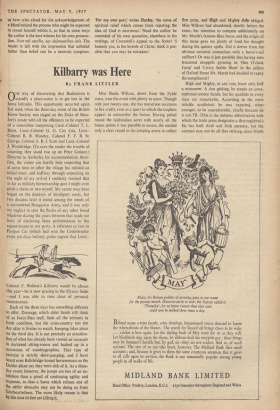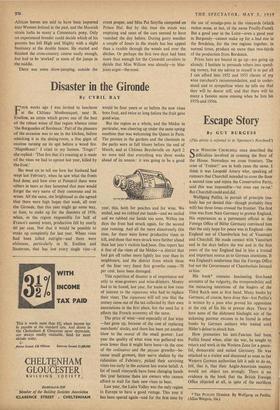Kilbarry was Here
By FRANK LITTLER ONE way of discovering that Badminton is actually a place-name is to get lost in the horse latitudes. This opportunity occurred again last week when the three-day event of the British Horse Society was staged on the Duke of Beau- fort's estate with all the efficiency to be expected of a committee comprising Lieut.-Colonel T. L. Horn, Lieut.-Colonel G. G. Cox Cox, Lieut.- Colonel R. 13. Moseley, Colonel F. F. B. St. George, Colonel A. B. J. Scott and Lieut.-Colonel J. Wooldridge. (To save the reader the trouble of counting, they stand two up on Peter Ustinov.) Directed to Amberley for accommodation, there- fore, the visitor can hardly help suspecting that at some time or other the village has mislaid an initial letter, and halfway through unpacking on the night of my arrival I suddenly realised that as far as military horsemanship goes I might even pitch a claim or two myself: My career may have begun on the donkeys of Southport sands, but two decades later it ended among the steeds of a surrendered Hungarian Army, and it was only illy neglect to spur the flanks of any other breed whatever during the years between that made me leery of disclosing these performances to the equestriennes in our party. A reference or two to Pampas Cat (which had won the Cottesbrooke event ten days before), polite regrets that Lieut.- Colonel F. Weldon's Kilbarry would be absent this year—he is now grazing in the Elysian fields and I was able to steer clear of personal reminiscence.
Each of the three days has something different to offer. Dressage, which older hands still think of as fancy-Dan stuff, finds all the entrants in fresh condition, but the cross-country test the day after is livelier to watch. Jumping takes place on the third day. It is not precisely an actualisa- tion of what has already been viewed ad nauseam in darkened sitting-rooms and hashed up in a succession of autobiographies. That type of exercise is strictly show-jumping, and I have heard even Ballsbridge-bound horsewomen on the Dublin plane say they were sick of it. As a three- day event, however, the jumps are less of an ex- hibition than a. proof of continuing agility and response, so that a horse which refuses one of the stiffer obstacles may not be doing so from faintheartedness. The more likely reason is that by this time its feet are killing it. Miss Sheila Willcox, down from the Fylde coast, won the event with plenty to spare. Though only just twenty-one, she has numerous successes to her credit, even at a sport in which the trophies appear to outnumber the horses. Having pelted round the latifundian acres with nearly all the bonus points it was possible to amass, she needed only a clear round in the jumping arena to collect first prize, and High and Mighty duly obliged. Miss Wilcox had abandoned, shortly before the event, her intention to compete additionally on Mr. Marsh's famous Blue Jeans, and the origin of this name gave me plenty of food for thought during the quieter spells. Did it derive from the obvious sartorial connection with a horse's-tail coiffure? Or was it just possible that having seen trousered shopgirls gyrating to 'One O'clock Jump' and 'Livery Stable Blues' in the cellars of Oxford Street Mr. Marsh had decided to repay the compliment?
High and Mighty, at any rate, bears only half a misnomer. A dun gelding, he stands an unex- ceptional sixteen hands, but his qualities in every class are remarkable. According to the more reliable scuttlebutt he was expected, when younger, to be unpredictable, chiefly because he is not TB. (This is the dubious abbreviation with which the trade press designates a thoroughbred.) He has both Arab and Irish ancestry, but the contrast may not be all that striking, since North African horses are said to have been imported into Western Ireland in the past, and the Moorish • strain lurks in many a Connemara pony. Only an experienced breeder could decide which of his parents has left High and Mighty with a slight hesitancy at the double fences. He started and finished the cross-country course easily enough, but had to be 'worked' at some of the jumps in the middle.
There was some show-jumping, outside the event proper, and Miss Pat Smythe competed on Prince Hal. But by this time the estate was emptying and most of the cars seemed to have vanished the day before. During gusty weather a couple of hours in the stands has less appeal than a ramble through the woods and over the ditches. Or perhaps the first two days had been more than enough for the Cotswold cavaliers to decide that Miss Willcox was already—in blue- jeans argot—the most.











































 Previous page
Previous page